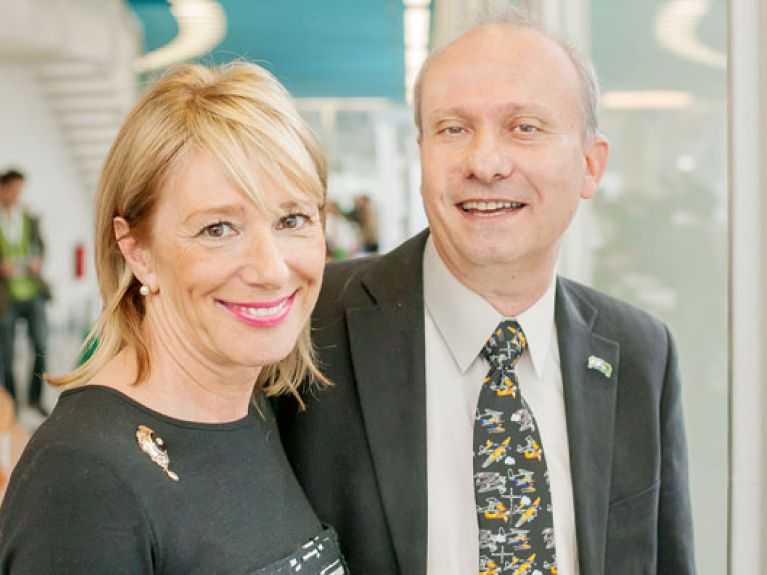Green door-openers
The JNF Green Business Circle is a bridge builder for German and Israeli entrepreneurs with a focus on sustainability.

A mighty palm tree reaches up into the ever-blue sky over Haifa. Albert Einstein planted it 90 years ago, directly in front of Technion – Israel Institute of Technology. The oriental-looking building also breathes history. Designed by the Jewish architect Alexander Baerwald from Berlin, the building now houses a museum and science park. The ensemble is a symbiosis of technology and nature – and a document of German-Israeli history.
The green space is showing its age, the lawns pitted and worn. But a German-Israeli initiative is breathing new life into the Albert Einstein Science Park. The JNF Green Business Circle (JBC) set up by the environmental organisation Jewish National Fund (JNF) is seeking to network entrepreneurs from both countries – as well as getting them to assume social responsibility for environmental projects in Israel. Through the fund, the JBC is also active in the Research for Sustainable Development network, which was launched by the Federal Ministry of Education and Research (BMBF).
One million euros in donations are now to be used for the Einstein Park’s restoration. The idea is to present exhibits on water engineering and solar energy designed to sensitise visitors to the ecological challenges facing Israel. In the long term, the JBC could even usher in a new chapter in German-Israeli cooperation on green future technologies.
Schaul Chorev is fond of stories like that of the museum gardens. “We want to tell such fascinating stories for the benefit of those who are interested in winning partners from other countries. Just to show them what’s possible,” says Chorev who, along with Heike Hausweiler, is jointly responsible for the JBC. That’s why Chorev invited the Israeli entrepreneur Michael Strauss to attend an event in Berlin. Strauss’s father fled Nazi Germany and worked his way up from small farmer to head of one of Israel’s biggest food companies with production facilities in 17 countries – and a sustainable corporate policy. “Strauss’s son has now shifted part of his production back to Germany.”
Besides highlighting success stories like this one, the JBC also devotes its attention to issues such as economic cooperation on green technologies – for example, at the Green Business Circle’s 2011 kick-off event in Munich. In 2009, Siemens had acquired the Israeli solar-thermal specialist Solel. A panel discussion on the takeover focused on environmental technologies and high-tech synergies. “We were looking for answers to these questions: What brings Siemens to Israel to buy a company like Solel? Where do the opportunities lie? And where are the difficulties?” explains business lawyer Friedrich Tobias Schöne, a JBC board member. Business leaders then had the chance to enquire about investment opportunities in Israel’s renewable energy sector at first hand.
At the previous six events – each of which drew over 100 participants – this sort of focus on concrete business projects was the exception, though, Schöne points out. It is precisely the Green Business Circle’s informal and platform-like nature that constitutes its unique selling point, he explains. “It has that typical club atmosphere: you get to know each other, then meet up again and develop ideas in the process.”
The Green Business Circle is a positive force in relations between the entrepreneurs. “There are marked differences in mentality¸” says Schöne, “and the JBC’s just the place to learn more about them.” When negotiating, Israelis are much more direct and demanding, explains the lawyer, who has also lived and worked in Israel. “Germans soon start to feel: this is getting aggressive,” says Schöne. By contrast, the Israeli side sometimes misconstrues German managers’ often firm but reserved manner as indecisiveness.
“Cooperation with German companies is always the most difficult and time-consuming – but ultimately always the best and most enduring,” says Chorev, who worked in Berlin before moving to an Israeli firm. And what about history and the Holocaust? Despite a strong awareness of the past, that now plays hardly any part in the highly professionalised negotiations, says Friedrich Schöne.
Apart from fostering relationships, the JBC can boast concrete results and successes in other areas – especially in terms of sustainability and environmental protection. Jewish National Fund sponsors include the optics company Bresser, which has donated a five-figure sum to provide binoculars for birdwatching, as well as microscopes for research stations that are testing more-efficient sustainable farming methods. VW has donated a firefighting vehicle to help protect against forest fires. Big firms especially, like Lufthansa, Michelin or the Israeli generic drugs manufacturer Teva, are engaged in the Business Circle – and make donations to the JNF as well, says Schöne. That’s also a way for companies to improve the sustainability profile of their corporate social responsibility strategies.
The property entrepreneur Albert Ben David, who has bought the Funkhaus Berlin Nalepastrasse (the former premises of the East German broadcasting services) in Berlin, sees himself as a bridge builder between conventional sustainable business and the high-tech green sector. In his construction projects, innovative environmental technology pays off in the long run, he emphasises. Israeli start-ups are, he points out, among the leading providers of solar and water recycling technologies. What we need to do, says Ben David, is couple Israelis’ innovativeness and ability to improvise with Germans’ organisational talent and “the experience of the world’s best industry”. “This is a dialogue to which the Green Business Circle has a contribution to make.”

